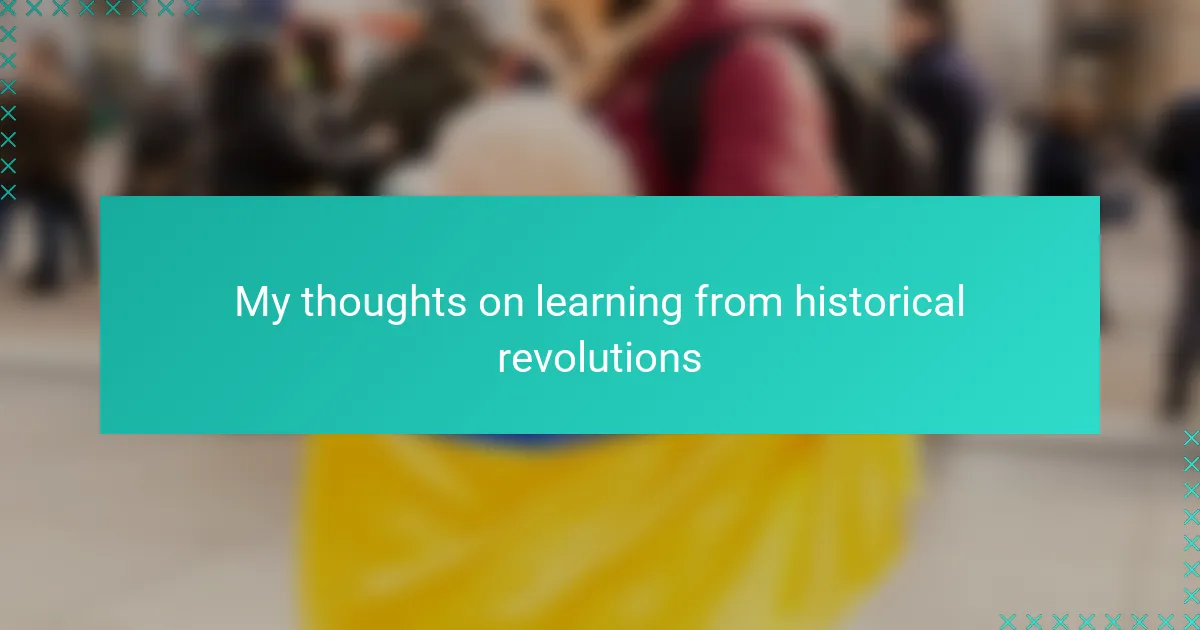Key takeaways
- Revolutions are fueled by collective emotions like anger and hope, highlighting the fragility and resilience of human systems.
- Effective political change requires a balance of passion with strategic planning, addressing underlying social grievances for sustainable progress.
- Inclusivity in political movements enhances authenticity and strength, while flexibility is essential for adapting to changing circumstances.
- The global impact of revolutions can reshape political dynamics across borders, emphasizing the need for thoughtful governance amidst rapid change.
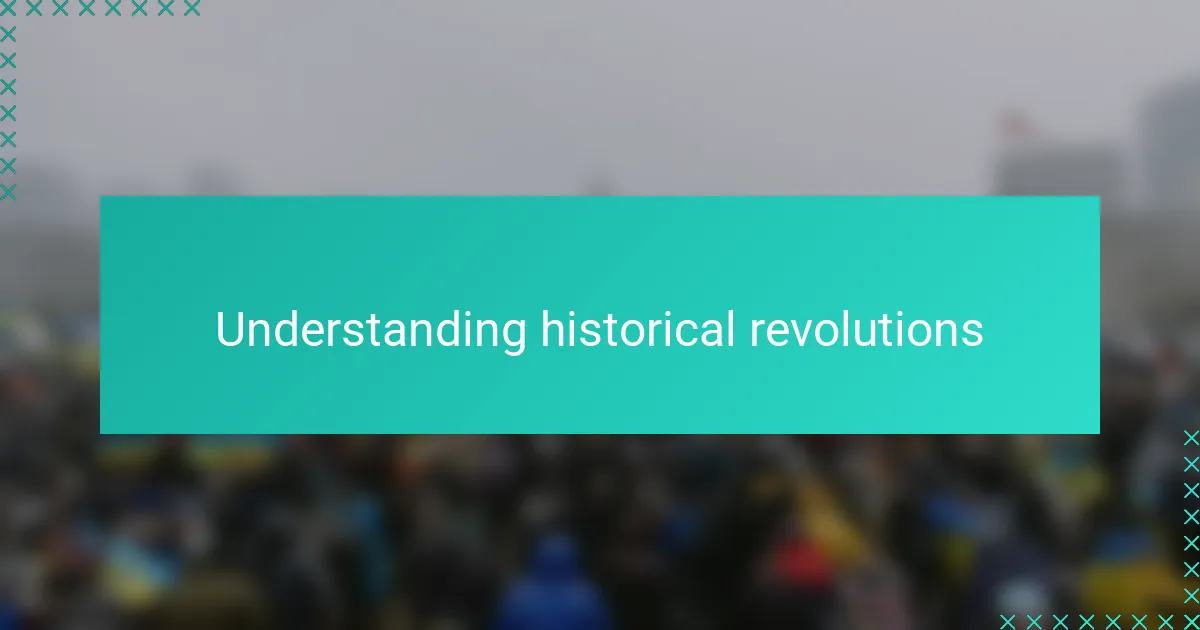
Understanding historical revolutions
When I look back at historical revolutions, I see them as both dramatic upheavals and deeply human stories. These events weren’t just about changing governments; they were about people’s hopes, fears, and frustrations boiling over. Have you ever wondered what it feels like to live through a time when the very fabric of society is being rewritten?
Understanding these revolutions means peeling back layers of complex causes—economic disparity, political repression, social injustice—and recognizing how these factors ignite collective action. From my perspective, it’s impossible to separate these elements from the emotions driving them, like anger and a desperate desire for change.
What strikes me most is how revolutions reveal both the fragility and resilience of human systems. They remind us that while institutions can collapse, the spirit pushing for freedom and fairness often endures. This duality makes studying revolutions endlessly fascinating and deeply relevant to our current political landscapes.
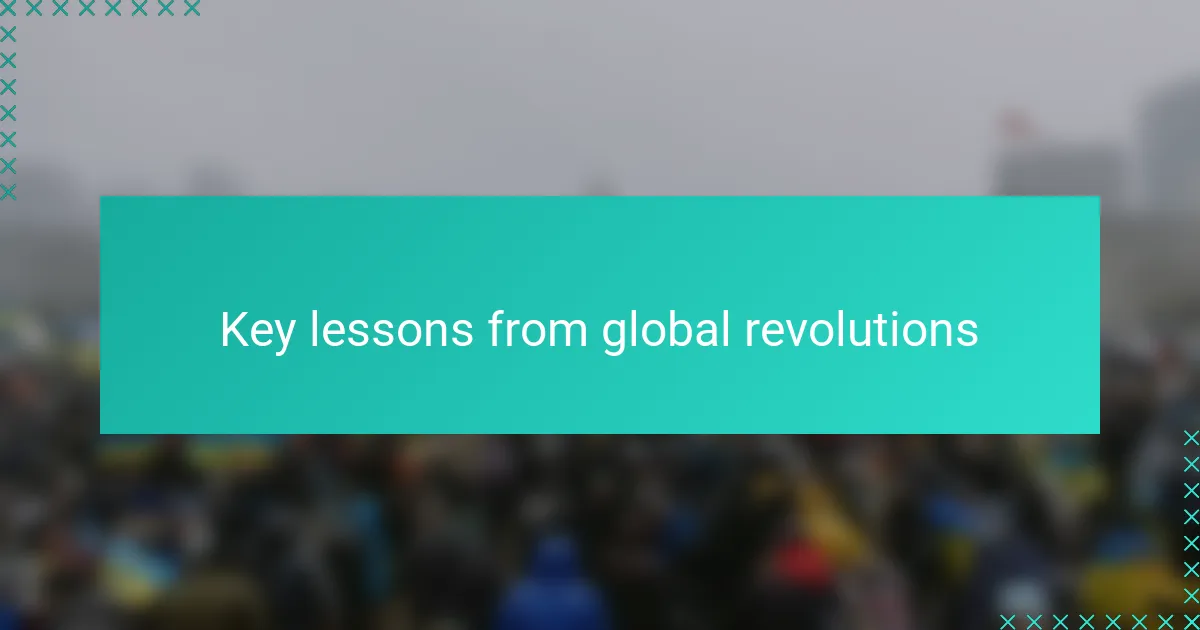
Key lessons from global revolutions
One lesson that always stands out to me is how revolutions teach us the power of collective will. When people unite around a shared cause, even the most entrenched systems can be shaken. Have you noticed how this unity often arises not from calm planning, but from raw urgency and shared frustration?
Another insight I’ve gained is the unpredictable nature of outcomes. Sometimes revolutions bring lasting change, other times chaos or repression follow. This contradicts the simplistic idea that revolutions guarantee progress — it’s a stark reminder that intentions alone don’t shape history; actions and context do.
What really stays with me is how revolutions reveal the importance of leadership and vision beyond just overthrowing power. Without a clear roadmap for what comes next, the euphoria of change can quickly fade into disillusionment. It makes me wonder: how often do we forget to plan not just to break down old structures, but to build new ones thoughtfully?
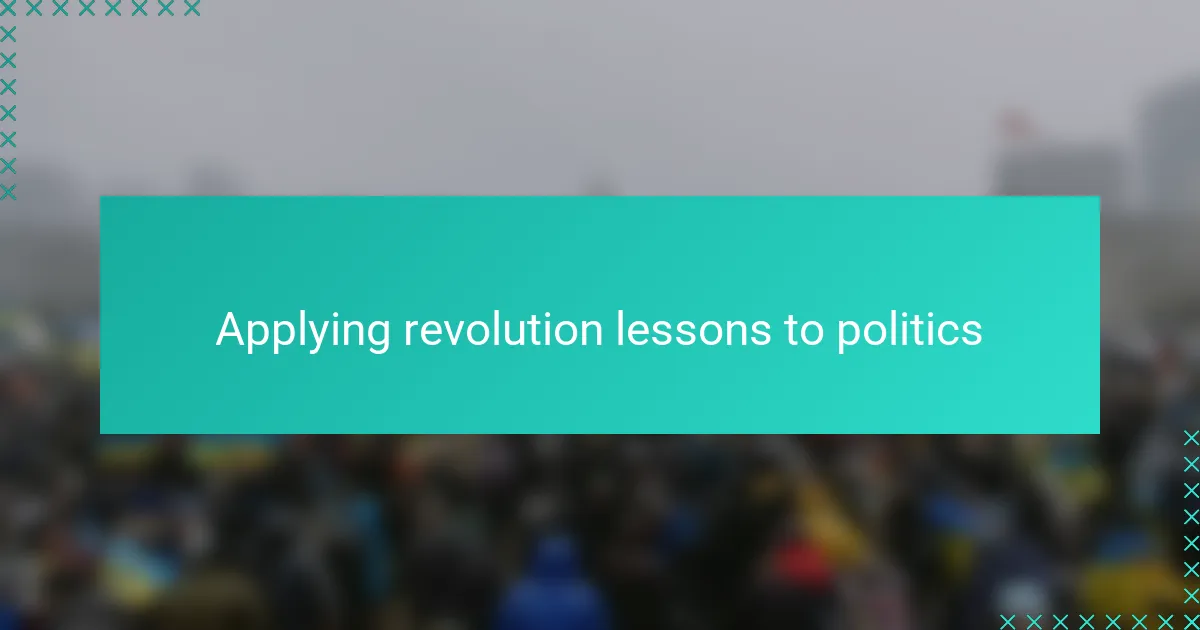
Applying revolution lessons to politics
When I think about applying lessons from revolutions to today’s politics, I’m reminded that real change demands more than bold declarations—it requires sustained commitment and clear vision. Have you ever noticed how political movements energized by passion sometimes lose momentum because they underestimate the challenges of rebuilding? That tension between idealism and practical governance is something history keeps warning us about.
From my experience observing political shifts, I see that leaders who fail to address underlying social grievances risk repeating past mistakes. It’s not enough to topple a regime; you have to understand why people felt marginalized in the first place. This insight feels crucial because politics isn’t just about power—it’s about responding to human needs in a lasting way.
I also find it fascinating how the emotional energy behind revolutions fuels political change but can also lead to unintended consequences. How often do we ignore the complexities beneath the surface, simplifying movements into neat narratives of good versus bad? Recognizing this complexity helps me appreciate how fragile progress can be and why thoughtful dialogue remains essential in politics today.
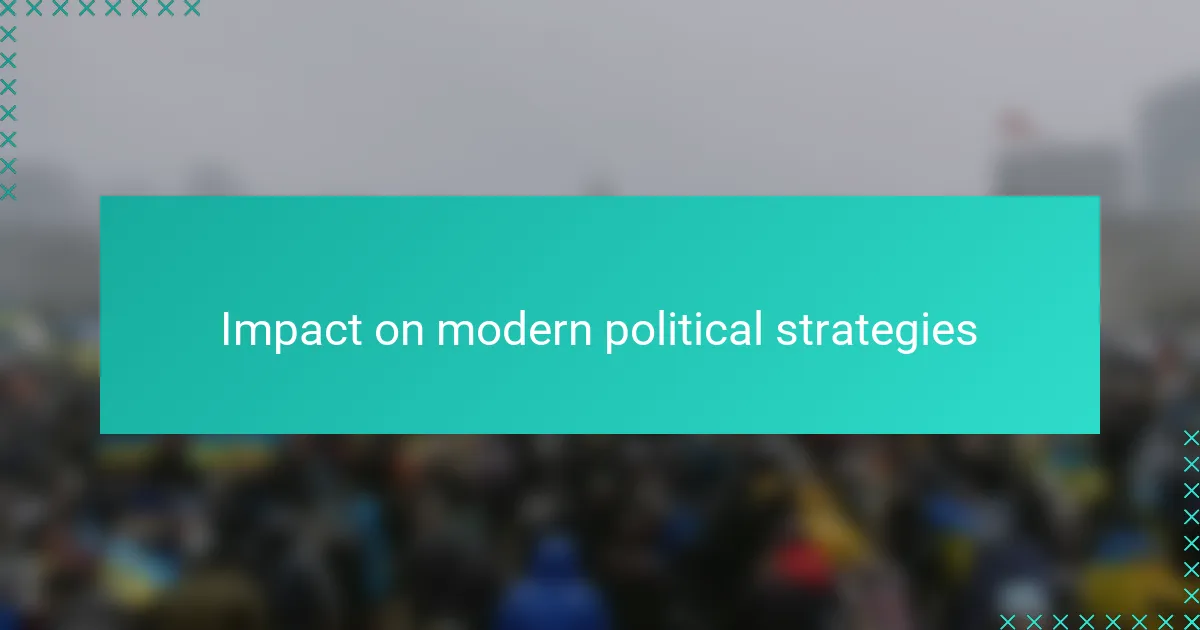
Impact on modern political strategies
When I reflect on modern political strategies, I can’t help but notice how much they borrow from the playbook of past revolutions—mobilizing mass support quickly and leveraging symbolic acts to signal change. Yet, I also wonder: do today’s strategists fully grasp the emotional undercurrents that fueled those historic uprisings, or are these tactics becoming mere performance without the same genuine connection?
In my view, successful political movements today seem to balance urgency with careful planning, learning that spontaneous energy needs structure to survive long-term. Have you seen campaigns that ignite incredible enthusiasm only to fizzle out because they lacked a sustainable vision? This tension highlights how historical revolutions influence strategy beyond just seizing power—they teach us about pacing, resilience, and adapting to shifting societal moods.
What surprises me most is how modern leaders still struggle with the same challenges revolutionaries faced—building inclusive coalitions, managing dissent, and addressing deep-rooted inequalities. It makes me think: despite all our technological advances, are we really evolving in political strategy, or are we just repackaging old lessons with new tools? This question keeps me pondering the true impact revolutions have on shaping today’s political playbook.
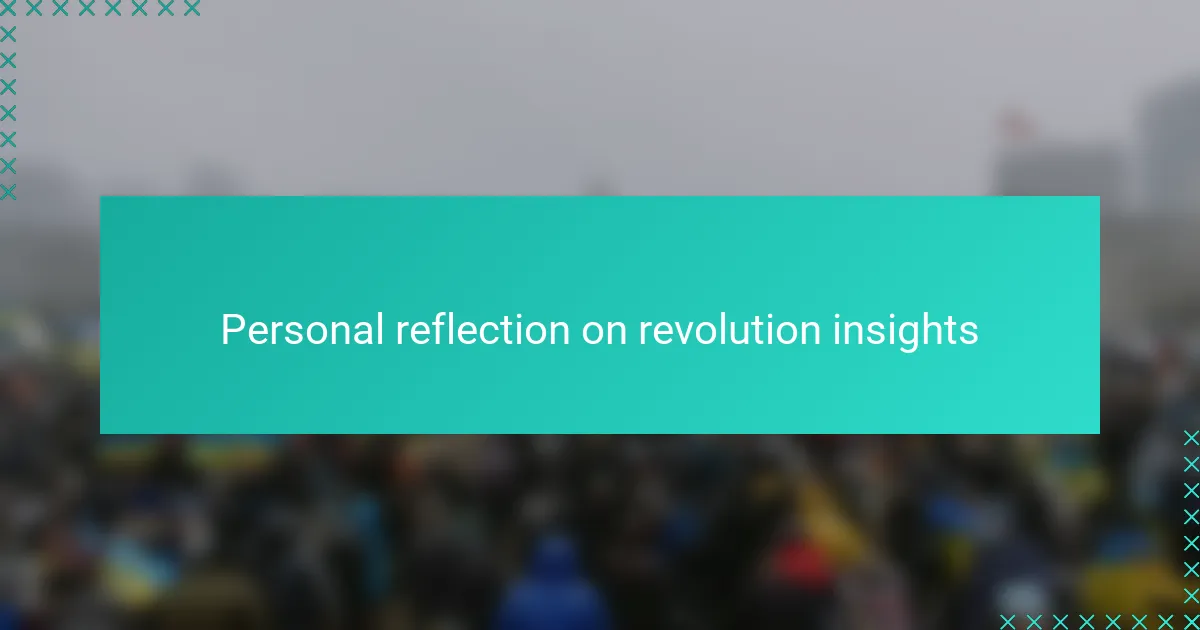
Personal reflection on revolution insights
Reflecting on revolutions personally, I’m often struck by how much these moments of upheaval mirror the complexities inside each of us. I remember reading about the French Revolution and feeling a deep empathy for those who balanced hope with fear, unsure if the path ahead would bring liberation or chaos. Doesn’t that mix of hope and uncertainty resonate with how we face change in our own lives?
Sometimes I catch myself wondering if the emotional intensity behind revolutions is what makes them so powerful—and yet so fragile. From my experience studying them, it seems those emotions can either unite people or tear them apart when the initial momentum fades. Have you noticed how easily passion can give way to fatigue or disillusionment if it’s not carefully nurtured?
What really stays with me is the reminder that revolutions aren’t just historical events but living lessons about human nature. They force me to ask: how can we harness that same drive for justice and change in our own political actions without repeating past mistakes? It’s a question I keep coming back to, knowing the answers are never simple but always worth exploring.
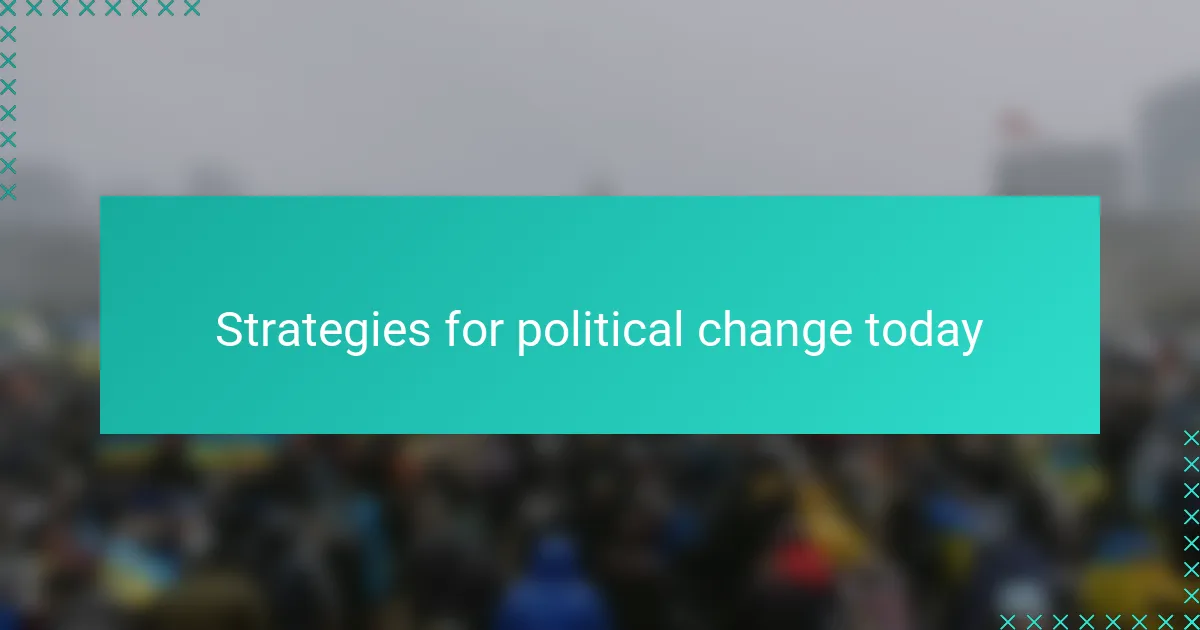
Strategies for political change today
When I consider strategies for political change today, what stands out is the importance of blending passion with patience. Have you ever seen a movement erupt with excitement, only to wane because it lacked a clear roadmap? From my own observations, lasting change rarely comes from bursts of anger alone; it needs steady organization and a plan that stretches beyond the immediate moment.
Another strategy I find critical is embracing inclusivity. Political change feels most authentic and sustainable when diverse voices are heard and involved. I remember watching a grassroots campaign that initially failed because it ignored certain communities—once those groups were included, the movement gained strength and resilience. Doesn’t this highlight how exclusion can silently undermine even the most powerful calls for change?
Finally, I’ve noticed that adapting to unforeseen challenges is vital. No plan survives intact, and political environments shift rapidly. How many times have we seen leaders stick rigidly to outdated tactics, missing new opportunities or failing to quell emerging tensions? In my view, flexibility isn’t just a nice-to-have—it’s essential for turning the spark of revolution into the fire of meaningful transformation.
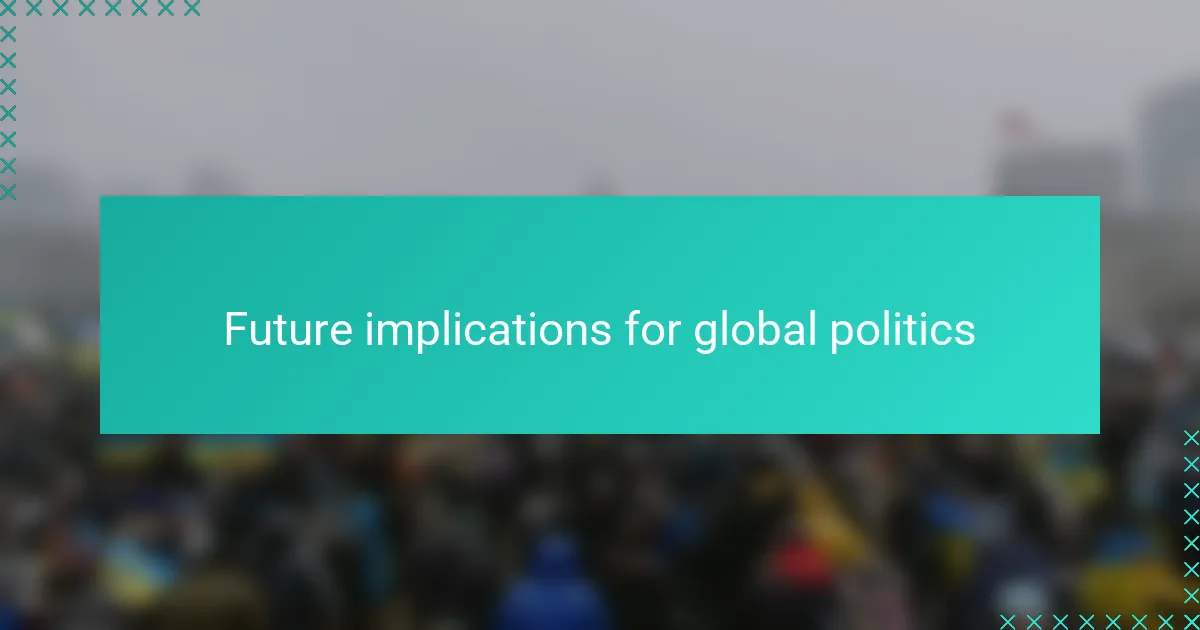
Future implications for global politics
When I think about the future implications of revolutions on global politics, I can’t help but wonder how the emotional energy behind past uprisings will influence emerging movements worldwide. Will new generations harness that passion wisely, or will we see history repeat itself with fleeting momentum and unmet expectations?
From my perspective, the ripple effects of revolutions extend well beyond borders, reshaping alliances and power dynamics in unpredictable ways. How often do we pause to consider how a revolution in one region can spark similar sentiments halfway across the globe, setting off a chain reaction that redraws the political map?
It also strikes me that in an increasingly interconnected world, the stakes are higher than ever. The lessons from revolutions remind me that global leaders must balance rapid political change with thoughtful governance—otherwise, the instability sparked today might become the chronic crises of tomorrow.
